Don’t see your cat drinking much at home? Cats are notorious for being fussy about water and not drinking enough. It can lead to many complications such as dehydration, kidney issues and urinary tract problems. This is especially so in our warm Singaporean climate, where cats also might lose moisture from sweating through their paws. In this article, we will share ways to help make sure your cat is drinking enough water and is well-hydrated!
How Much Water Should My Cat Be Drinking?
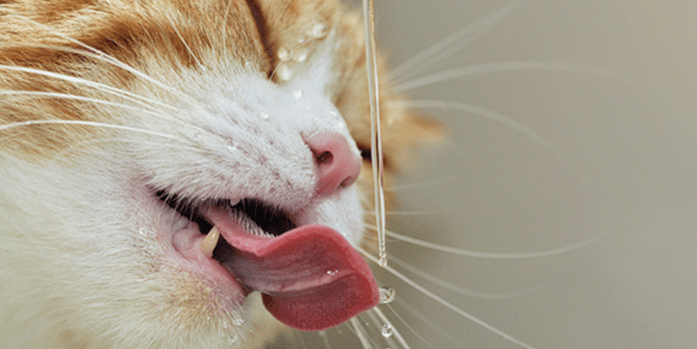
Cats need 104ml – 133ml (3.5oz – 4.5oz) of water per 2.27kg (5 pounds) of body weight everyday. This means that your 4.5 kg cat should be getting around 1 cup of water a day.
However, don’t panic if you don’t see your cat drinking that much from their water bowl. Wet cat food also contains plenty of water (for wet food, usually >80% of its content is water!). Thus, your cats might not require much additional water outside of their meals.
Having said that, if your cat mainly eats dry food such as kibble, they will definitely have to get more water from other sources.
Why Do Cats Often Not Drink Enough Water?
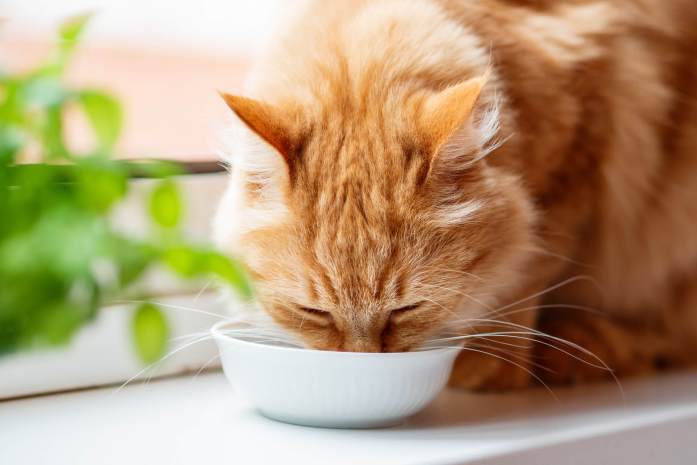
There are a few theories as to why cats might not drink much water. In the wild, cats usually get water from their prey, such as mice and birds, which have high moisture content. As a result, they do not drink much from external sources.
In addition, domestic cats today also retain many characteristics from their ancestors, which were desert-dwelling wild cats. This allows domestic cats to survive with low water intakes due to their ability to produce concentrated urine to reduce water loss.
Many of our cats are also extremely picky with how they like their water. This behaviour might be derived from habits formed by their past generations. Whether it’s to avoid contamination or to find the freshest water for consumption, there is no denying that cats are one of the fussiest pets when it comes to drinking water.
However, it is a point of concern if your cat is not drinking as much water as they used to. It could signal that they could have an underlying illness. If you notice such behaviour, please consult your vet as soon as possible.
What Happens If My Cat Isn’t Drinking Enough Water?
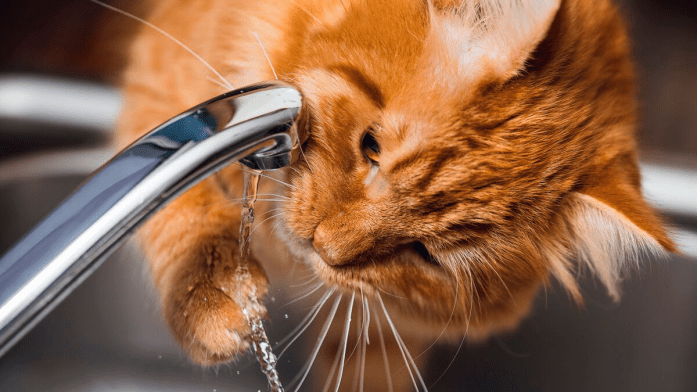
Cats that don’t drink enough usually end up with dehydration. This is caused by excessive fluid loss, which also means that the body loses important electrolytes like sodium and potassium. Senior cats, or cats that are ill from certain diseases, such as kidney failure, cancer or diabetes are also more susceptible to dehydration.
Symptoms Of Dehydration
The following are some of the most common signs of dehydration:
- Dry, tacky gums
- Depression
- Diarrhea
- Elevated heart rate
- Lethargy
- Loss of appetite
- Little to no urination
- Panting
- Sunken eyes
- Trembling
- Vomiting
Most importantly, if you suspect your cat might be dehydrated, you should try checking your cat for ‘skin tenting’, by pulling the skin around the cat’s shoulders up and letting go. If the skin remains up in a ‘tent’ and does not fall back down, it might signal that your cat is severely dehydrated and will require a trip to the vet.
At the vet, dehydrated cats are usually treated by giving them fluids through a needle. This can last for a from few hours to even a few days in serious cases.
Treatment & Monitoring
If not treated, dehydration can lead to urinary problems such as urinary tract infections, urinary stones and crystals as well as a higher risk for kidney disease.
However, if you are caring for a senior cat or a cat that is susceptible to dehydration and urinary issues, you might want to consider getting the Cat Litter Company Health Indicator. Mixed into your cat’s regular litter, this indicator can help alert you when there are anomalies detected in your cat’s urine, so you can bring your cat to the vet early.
How Can I Make Sure My Cat Is Drinking Enough Water?
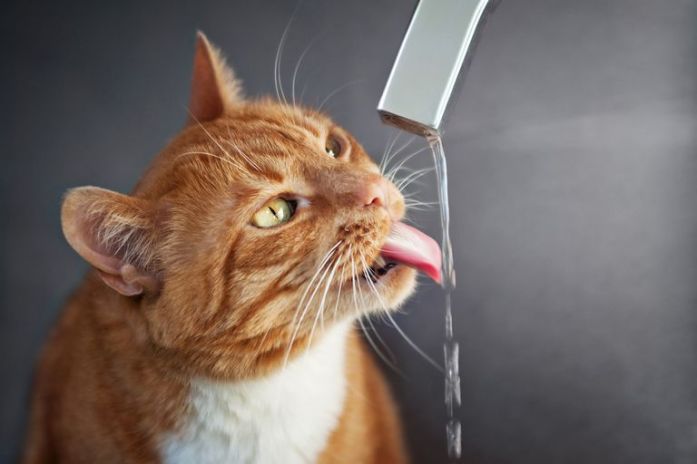
Dehydrated?
If your cat shows signs of dehydration, it is crucial to get them to the vet as soon as possible. However, in the meantime, it might be good to encourage more drinking on your own. Hence, you can try enticing your cat to drink by adding a little tuna juice or broth to water as a temporary solution.
Wet Cat Food
The easiest way to get more moisture is through feeding your cat wet food. Tasty with high water content, wet cat food provides cats with liquid they are more than happy to slurp up. If you are feeding your cat kibble, you can also opt to use supplementary wet food as a delicious meal topper.
However, there are definitely cats out there that do not enjoy wet cat food. Thus, when feeding your cat kibble, frozen, air-dried or freeze-dried food, it might be good to mix in some extra water along with their meal to ensure they stay hydrated.
Liquid Cat Treats
Don’t stop at just wet food! Try adding some liquid cat treats into your treat stash as well. Usually fed from hand or used as a meal topper, liquid cat treats come in a huge range of tasty flavours to choose from.
Moreover, just like the movies, many cats also love drinking milk even though they are lactose-intolerant. If your cat likes milk, try treating your cat to some lactose-free pet milk every now and then to replenish their thirst.
Choosing The Right Bowl(s)
Cats can be extremely fussy about their preferred choice of bowls. Make sure to choose a bowl that is shallow — a deep bowl might not only make it difficult to drink from. It might also put unnecessary stress on your cat’s whiskers which might discourage them from drinking.
In addition, bowls that are elevated and tilted might also help make it easier to drink from, especially for older or injured cats.
The number of bowls also matters! This is especially so if you have a multi-cat household or a relatively large house.
Location
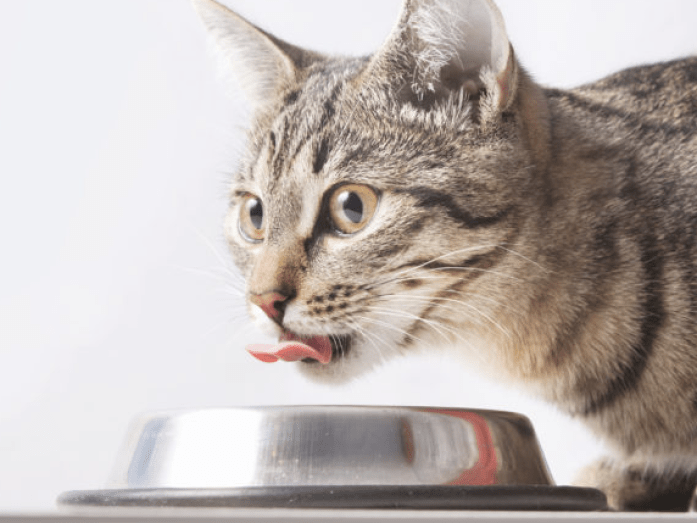
Where you put the water bowls can affect drinking habits too. Try putting their bowl away from their litter boxes and food bowls. Cats are unlikely to drink near where they defecate, and in the wild, cats have also been observed to not eat near water sources to avoid contamination.
Water
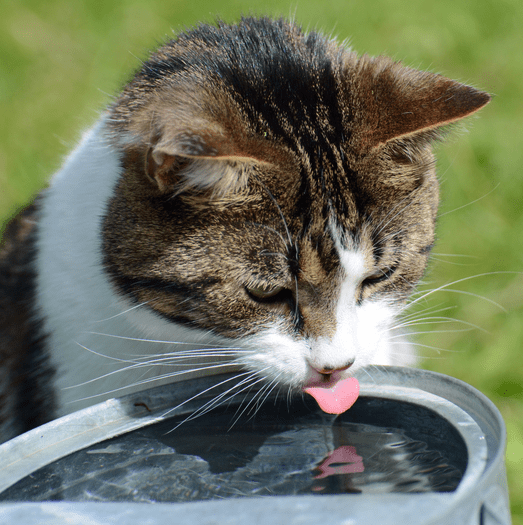
The freshness of the water also plays a part in whether cats choose to drink it. The longer your cat’s water bowl sits out, the more particles such as dust, dirt and hair it collects. Thus, it is best to change it once or twice a day. This also means that bowls should often be thoroughly cleaned to ensure the water stays clear and pristine.
Furthermore, just like how some of us love drinking iced water, some cats might also have the same preference too! Hence, try adding a few ice cubes the next time you refill their water bowl to see if they might be more likely to drink their water cold.
In addition, many cats also prefer running water (e.g. if your cat likes to drink from the sink). If your cat is like that, or one that is extremely picky, try getting a water fountain with filtering capabilities to provide your cat with fresh running water 24/7.
Sometimes, living in Singapore can mean that our weather might be a little too warm on some days for our feline friends. Other than encouraging your cats to drink more, make sure you provide them with a place to cool down. For example, having fans, cooling mats and cooling beds are all great ways to make sure your cat doesn’t overheat and become dehydrated.
If you would like to read more about how to better care for your cats, do check out ‘Stomach Sensitivity in Cats – What should I take note of?’ and ‘Things We Should Not Be Feeding Our Cats’.













